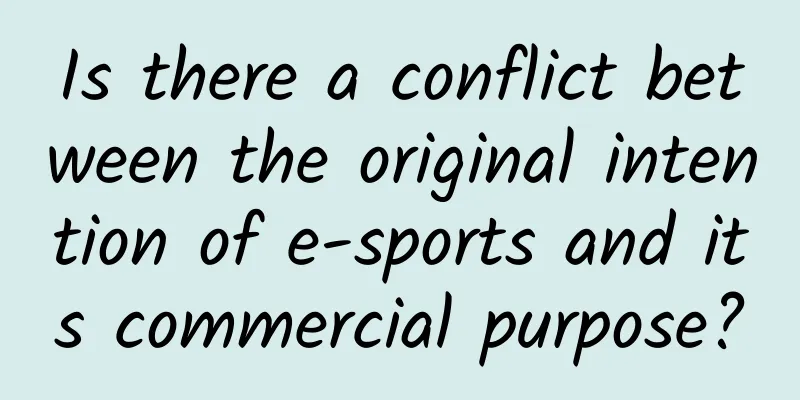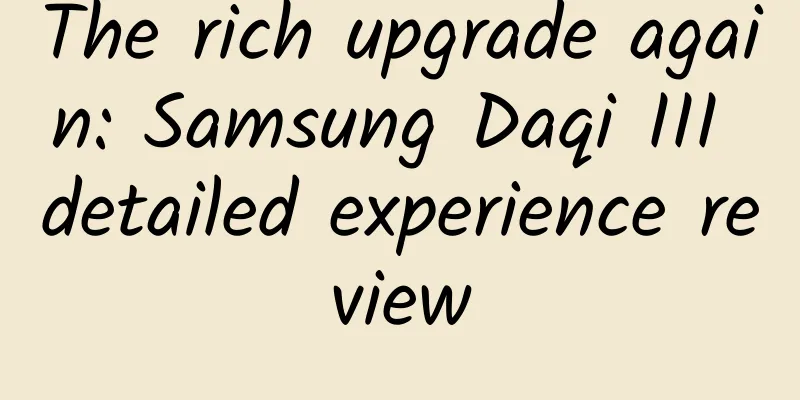Is there a conflict between the original intention of e-sports and its commercial purpose?

|
The annual "Esports World Cup", the DOTA2 International Invitational organized by Valve, this year's Ti6, ended today. Congratulations to the Wings team for winning the championship, and fortunately CN DOTA did not stumble in the "even years", although the whole process was quite thrilling and no one could be sure of the outcome until the last moment. Wings is a "too" young team. Its captain "y`Innocence" has just turned 18. This team had few fans and news one year ago. Although it made its mark in the Ti5 qualifiers, it was quickly forgotten by the public. This year, as they fought their way out of the siege in April and won the ESL Manila Championship by defeating the giant Liquid, their momentum has been full of twists and turns. They have performed well in the Summit League and the Nanyang Cup, but also left the Spring Split early, giving people an impression of being "very unstable" and "nervous". After qualifying as the top team in the Ti6 China Qualifiers and getting the chance to prove themselves on the stage of the International Invitational, many viewers finally stopped doubting that they were just a temporary phenomenon and began to place high hopes on their future. The final result does not need to be repeated, but how did this "new team" that does not even have an official promotional video from Valve stand out among the many strong teams? In other words, the previous champions were quite disappointed, and the directly invited teams were scattered. Ti6 was a grand performance of "the giants lost their luster". Wings and DC appeared in the finals. The former had a long history of being nicknamed "Tieba Team" by Chinese audiences, and the latter was even a recently formed "Avengers Alliance". If the overall collapse of the Chinese team in the winter season only made people aware of a regional phenomenon, then the performance of many giants in Ti6, which was at most "satisfactory", could not help but make people marvel - what happened to the giants around the world? What happened to the first-tier teams? From the "promotional film curse" to "drinking beer together" Although not all, before Ti6, Valve spent a lot of time shooting promotional videos with different focuses and styles for many strong teams, some focusing on the team, and some focusing on a certain player. These promotional videos are used to kill the boring time between offline games, and also let the audience get to know the teams and players from more angles outside the game. To match the promotional video, Valve set up a small detail of "having stars and shields" in the personal information display of the players before the game. Having stars means that the player has participated in the six Tis so far, and having shields means that the player has won the Ti championship with the team - both are quite rare honors, and there are only a handful of players with both stars and shields. However, surprisingly, none of the players in the Wings team that eventually won the championship had a star or shield - to be more specific, let alone "having participated in all Ti", for the five players of Wings, Ti6 was just their first. Similarly, the "Avengers" DC that met them in the finals only had one veteran, Misery, who had a star. This was the finals for two new teams. Perhaps there was one thing that was a little ironic: careful viewers discovered that there was a "promotional film curse" in the Ti6 arena, which roughly meant that whichever team's promotional film was broadcast before the offline game started would lose. Throughout the entire Ti6, the curse was fulfilled with few exceptions. Maybe this is just a coincidence. But some people have proposed a correlation hypothesis: Ti6 is the highest level of competitive arena, and Valve's carefully shot promotional video involves a lot of interviews and follow-up shots of the team members, and has to take care of the team's sponsors (in most promotional videos, sponsor ads are inserted in various clever ways, either in clothing, peripherals, or even seats), investing a lot of time and energy, but there is nothing about training, strategy, and maintaining form. The implication is that "too many" commercial activities may have affected the training of the participating teams to some extent, or interfered with the mentality of the players to a considerable extent. On the one hand, immersed in the atmosphere of "being the center of attention" before the game, the ambition or desire to win may gradually disappear; on the other hand, sponsors invested a lot of advertising fees before the game, filling the pockets of the players, and the desire for the Ti6 prize money may also plummet - although the total prize money of this Ti6 is as high as 20.73 million US dollars, and the champion Wings won 9.12 million US dollars, the average prize money for each player is 12 million RMB, which is probably not worse than any level of "sponsorship". If "slandering" the promotional video is still an exaggeration, then another phenomenon similar to the promotional video can be described as "being condemned by everyone" or even "objective smearing" and it is not an exaggeration to say that it is "drinking beer together" by the LGD team which is "hot in the rhythm" everywhere. LGD is a famous traditional Chinese team, but its performance in recent years has been disappointing. If the results of the competition are still "acceptable", its playing style and quality of competition are really disappointing. In short, like many old giants, LGD has fallen into a "passive" operation style of "not seeking to win by itself, but seeking the opponent's mistakes to pass", and the games are often so ugly that people can't help but curse. Teams similar to LGD include VG and NB before the winter season, and Secret and Alliance now. In fact, EG, the third place in this Ti, also has a similar tendency - even more so before Zai Mei returned. The result of being "passive" is that they wait for a win when facing a weak team, leave it to fate when facing a strong team, bully newcomers, and fight against weak teams in an ugly stalemate, and are immediately defeated when encountering a strong team. Fans often have high expectations and are repeatedly disappointed with such teams, and it is naturally difficult for "passers-by" to "respect" such teams. This also leads to an ordinary commercial sponsorship, which is smeared by various people as "not playing games, but doing other things." Before the Ti6, the LGD team and its players participated in the Harbin Beer's "Let's Drink Harbin Beer" marketing campaign on Weibo. It is said that this event "is the first time that Harbin Beer has been involved in the e-sports field, and it is also the first beer brand to enter the e-sports industry and sponsor an e-sports team to participate in a world-renowned event." Harbin Beer's sponsorship this time has reached the level of title sponsorship. In the Ti6 arena, the suffix of each LGD player's ID is "Harbin Beer". Unfortunately, as one of the six directly invited teams, LGD performed quite "glaringly" in Ti6. They suffered a series of losses during the group stage and entered the bottom of the loser group. In the second round of the knockout stage, they were eliminated 2:0 and failed to even enter the top 8. Moreover, they did not make a decent "struggle" during the defeat, with a slow rhythm and frequent mistakes, which was far from the four words "honor in defeat". In a sense, Harbin Beer's sponsorship is embarrassing. The fans and passers-by who felt the sharp gap between the funny Harbin Beer advertisement and the ruthless elimination reality generated endless anger and "humor", and they were "teasing" LGD everywhere (referring to endless ridicule and trampling), and even some gaming media joined in the trend. If we calm down and think about it, accepting "sponsorship" is a normal action for any commercial team, and it should be different from "playing badly in the game". As for whether the players clearly distinguish between the two in their minds in reality, it is not something that others can speculate. A typical counter-example is that in addition to the Harbin Beer sponsorship, LGD actually held Ti6 bar viewing events in Hangzhou and Chongqing. Of course, some people have raised objections to this, saying that this is still "not playing games, but focusing on other things"? But in fact, when you see the word "Chongqing", you should know that the Wings team, headquartered in Chongqing, also participated in the bar viewing event. In fact, the viewing event was jointly organized by LGD and Wings. One lost, the other became famous, which may or may not be related to "things outside the game". Live broadcast and original intention In fact, compared with advertising sponsorship, the issue that has long been criticized by fans and passers-by is the "player live broadcast" issue. Many people believe that since the rise of live broadcast platforms, some players are keen on live broadcasting to make money and neglect training, which ultimately leads to unsatisfactory team results. This kind of speech has become very popular after this year's winter season, and long before and in the future, all kinds of discussions about live broadcasts will never stop. Many well-known figures in the e-sports community are very secretive about the issue of live streaming, but some have spoken out. The opinions of people in the industry are bound to be slightly different from those outside the industry. If the opinions of both sides on the issue of "whether live streaming will affect the results of the game" are only slightly different, then the issue of "whether live streaming should be done" is very different. Will live streaming affect the results of the game? This question needs to be discussed in detail. There are many live streaming players, such as well-known foreign players Arteezy and EternalEnvy, who are keen on live streaming, and their personal abilities have not been questioned too much - it can be seen that the impact of live streaming on personal ability is not necessarily very specific. However, there is a huge difference between CW and strangers in terms of playing style and mentality. Cultivating habits and training mentality in stranger games, even if it "increases experience points", may not have a positive meaning in the game - not to mention that live streaming is different from simply "playing strangers". Pursuing program effects is only one aspect. The "distracted" state during live streaming is far from the "focused" state that should be pursued in the game. The competition is not a one-person show, and DOTA is definitely not a one-person game. In order to avoid leaking information, the team's training matches cannot be broadcast live, so there may be a conflict of time and energy between personal live broadcasts and team training. This also makes many viewers wonder "whether there are more live broadcasts and less training." When the team's performance is not satisfactory, the audience is naturally more inclined to judge "yes". If the discussion about live streaming only exists among the audience, the team will naturally remain silent on this debate. However, when professional players also voice doubts about live streaming, the team can no longer ignore this issue. In the transfer storm after the winter season this year, Sylar, a famous former LGD player, had a series of conflicts with the team due to contract disputes. Sylar even blurted out the malicious words "Why is a player who broadcasts live all day worth the same as me?" Sylar is a veteran with high skills, achievements and popularity. He is good-natured and low-key, and it is difficult to find fault with him. When Sylar, who rarely broadcasts live, criticized other players' live broadcasting behavior, the onlookers could not help but think that "because of the live broadcast, other people's performance is not as good as Sylar's" - it can be said that Sylar's original words basically revealed this meaning. Of course, although everyone sympathized with Sylar's experience when the crisis first emerged, after the storm settled down and the truth and details gradually surfaced, many professionals made professional judgments. These judgments not only revolved around live broadcasts, but also around a series of issues such as transfers. In summary, it can be said that it is a concentrated manifestation of the contradictions between the club, the players and the audience. From the club's perspective, the club operates in the form of a business, and "profit" is naturally the first goal. Therefore, regardless of whether the controversial live broadcast and controversial transfer will affect the club's game results, profiting from live broadcast and transfer is in line with the club's own position. If the club's profit from live broadcast and transfer is reasonable and legal, and there is a standardized contract, then its behavior is not only understandable, but also the meaning of the club's existence. In the players' view, their careers are limited, and although their career paths are not limited, they are not varied. Some players are smart and have rich social experience, so they can naturally use their professional or pre-professional identities to go into business outside of competition, such as opening a store or live streaming, thus transforming themselves from athletes to businessmen. Some players are relatively honest and dull (Sylar is one of them). They need to get better results, more bonuses, higher transfer fees and wages in their active stage, so as to accumulate enough capital in their active stage, so that they can make good plans after retirement. In their view, "live broadcasting" or "player trading mainly for money" are short-sighted behaviors, which will interfere with their professional careers in a certain sense, so they are naturally very wary of live broadcasting and player trading. In the eyes of the audience, the purpose of professional e-sports is much simpler - they will never care about the purpose of club operations, nor will they consider the livelihood of players after retirement, as long as the game is good and exciting. To some extent, the positions of most audiences and "honest" players overlap to a certain extent, but it should be noted that considering the natural person attributes of the players and the relatively short life cycle of professional e-sports for individuals, the "commercial operation" of the club and the "seeking a way out" of the players are the long-term plan, or the "normality", and blindly pursuing the "high quality" of the game is childish behavior. From this, we have even come to a certain extent to a ridiculous and sad conclusion - there is a contradiction between high-quality competitions and the high commercialization of e-sports. This contradiction is certainly not absolute, but it is not absolutely non-existent. Take DOTA2 as an example. The largest manager Valve is trying to balance this contradiction. By restricting the frequent transfer of players and artificially promoting the stability of club personnel, it can bring the audience as unified and long-term high-quality competitions as possible. Of course, the effect of such efforts will be judged by time. Moreover, on the more controversial issue of live broadcasting, even Valve cannot intervene at all - if they cut off people's financial resources, they should at least compensate them. Without compensation, criticizing live broadcasting is just idle talk. Valve itself is not limited to the same contradiction: as a company, the "profit" and "game quality" of the DOTA2 project also conflict in a certain sense, and how to balance the two so that it does not exhaust all resources and collapse overnight is a question that every game company is thinking about. Conclusion Wings is not a real "passerby team" or "tieba team". Although it is low-key, it is also a commercially operated club. After winning the Ti6 championship, the audience and companies will keep their eyes on Wings for a long time. By then, its commercial atmosphere is bound to be stronger, and whether the quality of the game will decline is an unknown. In fact, although there is a so-called "champion curse" in the Ti series, there are also examples of "not forgetting the original intention". For example, the NaVi team, which won one championship and two runner-ups from Ti1 to Ti3, is an excellent example of "gaining both fame and fortune". But NaVi is only one team. If EG, which won the third place in Ti6, can be regarded as the honor of defending champion, it is too much of a discount compared with the former NaVi. The innocent era is gone forever. With the growing commercial atmosphere, it is increasingly difficult to find the original intention of e-sports - but before lamenting like this, we might as well think about the fundamental reason why the former NaVi existed. The reason is actually very simple. When we think endlessly about the conflict between "commercial interests" and "game quality", we may be able to remember that, apart from the conflict, the "consistency" between the two also exists. As a winner of Toutiao's Qingyun Plan and Baijiahao's Bai+ Plan, the 2019 Baidu Digital Author of the Year, the Baijiahao's Most Popular Author in the Technology Field, the 2019 Sogou Technology and Culture Author, and the 2021 Baijiahao Quarterly Influential Creator, he has won many awards, including the 2013 Sohu Best Industry Media Person, the 2015 China New Media Entrepreneurship Competition Beijing Third Place, the 2015 Guangmang Experience Award, the 2015 China New Media Entrepreneurship Competition Finals Third Place, and the 2018 Baidu Dynamic Annual Powerful Celebrity. |
<<: OnePlus completely closes offline stores: input costs and outputs do not match
>>: Why did Folding Beijing win the Hugo Award despite the scarcity of technological elements?
Recommend
How can SEM managers perform data analysis and SEM management?
For KA accounts with annual consumption of more t...
How to build a startup brand from 0 to 1? (Attached with product case review)
Many brands have survived the most difficult time...
Ideal Auto: In August 2022, Ideal Auto delivered a total of 4,571 vehicles, two-thirds lower than its peak period
Ideal Auto released its sales results for August,...
Baidu Marketing Strategy 2020: Full-link Marketing in the Online Used Car Industry
2019 is a year full of uncertainty. The global ec...
For full-stack operations, this article is enough!
What is Full Stack The concept of full stack orig...
Android version split, developers don't need to worry too much
[[127176]] Recently, Google released a distributi...
Universal formula for best-selling brands
We see that some of the once "popular" ...
ARM's A77 chip may help Android phones surpass iPhones in 2020
According to foreign media reports, ARM has recen...
After 2 years, Android still hasn't found a better gesture control than iOS
Google pushed the Android Q Beta 3 test system up...
“On the 26th, go buy meat”, here are some tips to shop with confidence!
Review: Experts from the National Health Science ...
Why did no one in China applaud when Apple was found guilty of infringement?
Written in front: Did iPhone copy the appearance ...
The largest animal, the blue whale, can swallow dozens of tons of krill in one gulp, but it cannot swallow a person.
The largest animal that has ever appeared in the ...
Five-minute technical talk | A brief discussion on Android application startup optimization methods
The difficulty of startup speed optimization is c...
Shenzhou 17 will be launched into space next month | Why are they called “astronauts” abroad and “astronauts” in China?
As of 09:31 today The Shenzhou 16 crew flew for 1...
Carotid artery plaques found in physical examination? After getting the report, look at these 3 indicators first
Recently, many of my friends came to me worriedly...









